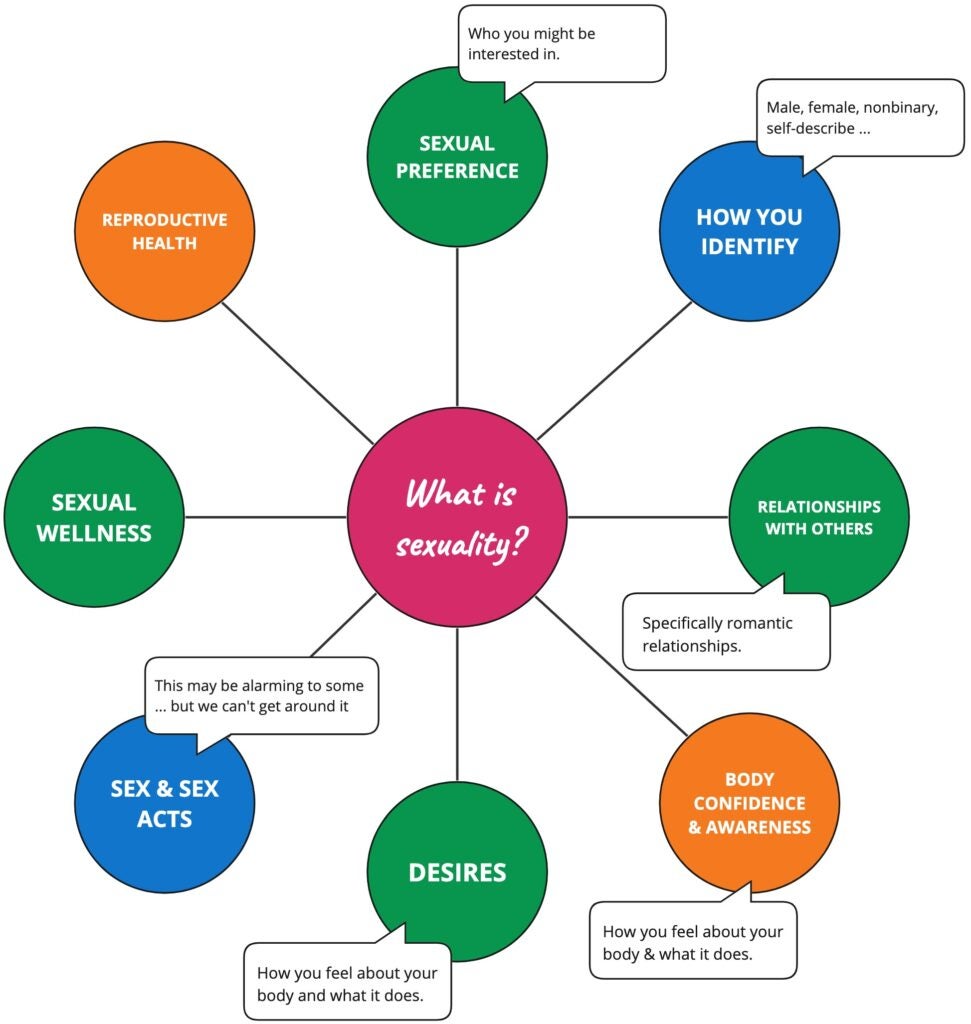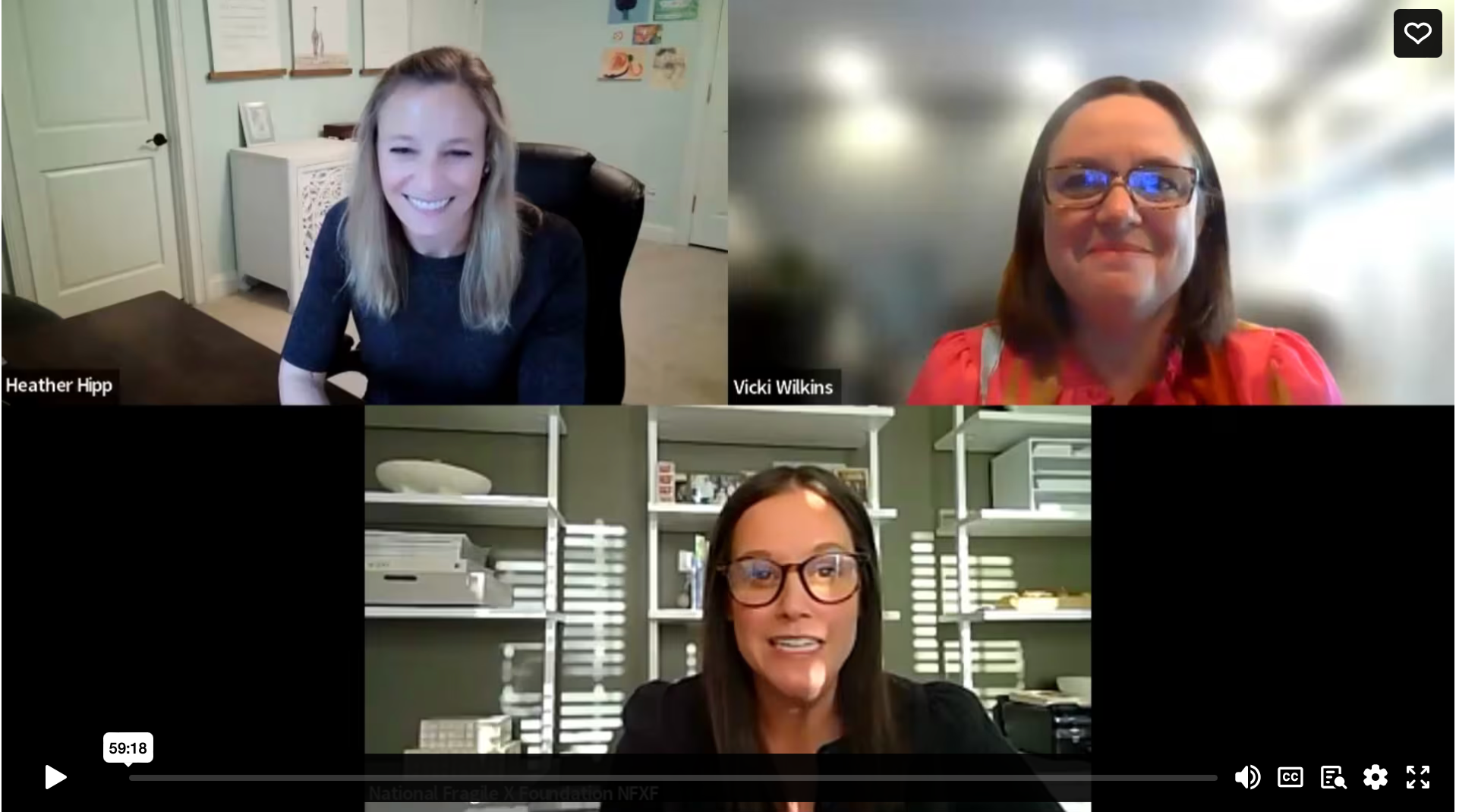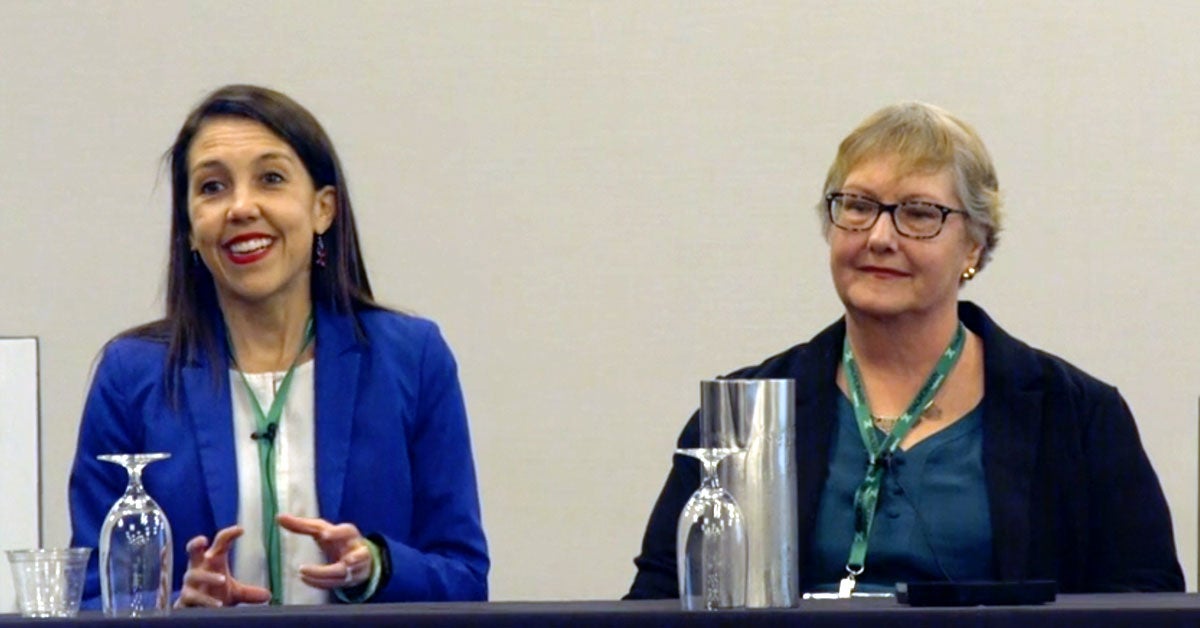Fragile X and Puberty & Sexuality
Depending on their age, it’s necessary to approach teaching children about relationships, the difference between public and private, body changes, feelings and emotions, reproduction, STDs, birth control, and how to keep themselves safe. You may even find you need a refresher for yourself before approaching the subject with them.
Webinars
Reproductive Health — Webinar
Drs. Heather Hipp and Victoria Wilkins joined us for an informative webinar on the topic of Reproductive health. This is a broad topic, covering the physical and emotional components of areas like puberty, sexuality, reproductive options, and family planning.
Navigating the Challenges of Puberty and Adolescence for Youth with Fragile X Syndrome — Presentation
This session discusses specific challenges that arise during puberty and adolescence while also providing youth and their caregivers with some strategies and resources to assist in navigating the teenage years. Presented by Holly Harris, MD, FAAP and Dinah Godwin, LCSW.
From Our Blog
Teaching Pro-Public Behavior: Public or Private?
How do we prepare our children to access their communities, without the risk of their being exploited, showing affection in inappropriate ways, using sexual language that may be misconstrued, or touching body parts that could bring legal action or, at the very least, a disgruntled public?
Puberty
Puberty is the time in a person’s life when their body starts to transition into adulthood. Puberty can come with a lot of feelings, emotions, and changes, making it a confusing and challenging time for the person going through it, and their loved ones. It can be strange to experience these changes and not know why it is happening.
Nine Tips to Help You Discuss Puberty With Your Child
1. IDENTIFY WHO SHOULD LEAD THESE CONVERSATIONS
It can be uncomfortable to talk about these things with a parent (or anyone!). If a parent isn’t comfortable with these conversations, identify someone your child may be comfortable with to discuss these sensitive topics. Engaging a professional with expertise in this area may help guide the discussion. This person should be comfortable answering questions and speaking openly.
Sometimes speaking with someone who has experienced the same things during puberty is most helpful. For example, a young girl may prefer to talk to someone who has already had their period.
2. FIND RESOURCES THAT WORK FOR YOUR CHILD
Does your child prefer to read books, look at pictures, watch a video, or listen to someone speaking? Find a resource on puberty that helps them learn in a way they prefer.
Many of the following resources are from the articles “How to Help Teens With Special Needs Navigate Puberty” and “Puberty and Your Child with Autism.” We are not endorsing any one resource specifically:
- Books by Terri Couwenhoven, MS, CSE, a certified sexuality educator specializing in creating programs and resources for people with intellectual or developmental disabilities, including their families and support professionals. See her books on Goodreads or Amazon.
- “Boys, Girls & Body Science: A First Book About Facts of Life,” by author Meg Hickling and illustrator Kim La Fave.
- “What’s Happening to Me? An Illustrated Guide to Puberty,” by author Peter Mayle and illustrator Arthur Robins.
- All About Periods from KidsHealth.
- Educational materials about Puberty from MARSHmedia.
3. ENCOURAGE QUESTIONS
Questions are natural. Let your child communicate their questions to you without judgment and answer honestly. Reiterate that they can always come to you and ask questions, and they will not get in trouble.
4. USE THE CORRECT NAME FOR BODY PARTS
Teach your child the correct name for their body parts and encourage them to use those names. This is important for general healthcare purposes and safety. This will also help you accurately explain the changes your child can expect to see.
5. EXPLAIN CHANGES BEFORE THEY OCCUR
Explain bodily functions like a menstrual cycle (period) or an erection before they occur. This helps your child know these things are “normal” and they can identify them when they occur.
6. PRACTICE GOOD HYGIENE
Share the importance of staying clean. Show them how to wash their entire body and use things like deodorant, razors (if comfortable), sanitary pads, tampons, or menstrual cups. Using visuals like a list with pictures or visual schedules may help.
7. DISCUSS APPROPRIATE BEHAVIORS AND SET UP RULES
Discussing things like privacy, sexual urges, and other feelings openly is important. Consider setting up rules like going to their room or bathroom when they need private time.
8. TALK TO OTHER PARENTS & CAREGIVERS
Learn from other parents and caregivers about how they navigated puberty with their child. It may be helpful to talk with other parents who have children with Fragile X syndrome or another intellectual or developmental disability.
9. BRAINSTORM WITH A PROFESSIONAL
Speak to your child’s doctor about resources and tools they would recommend. All of our Fragile X Clinical and Research Consortium (FXCRC) clinicians are comfortable discussing puberty and encourage you to establish a relationship with a clinic near you!
LEARN MORE
Puberty can be challenging to navigate. Go easy on yourself and let us know how we can help!
Talking with Your Daughter About Her Fragile X Syndrome Diagnosis
Are you wondering when and how to talk to your daughter about her Fragile X syndrome diagnosis? If so, you’re not alone. Many families struggle with deciding when the “right” time is and what to say. Here are some strategies to help in having a conversation with your daughter about her Fragile X syndrome diagnosis.
Females with FXS: Strategies for Developing Executive Functioning and Social Skills — A Webinar with Barbara Haas-Givler
Topics covered include considerations to take into account when looking into post-secondary education options, resources to help prepare for puberty, strategies (with examples) on how to support task initiation and completion, and backward and forward chaining and transitions.
Teaching Pro-Social Behavior: Public or Private?
Including people with disabilities in our communities poses significant challenges. While inclusion helps increase normalization, it also increases vulnerability to community risks and hazards. How do we prepare children and adolescents to access their communities, without running the risk of their being exploited?
EXTERNAL RESOURCES
Supporting Youth with Intellectual and Developmental Disabilities Through Puberty and Early Adolescence
U.S. Department of Health & Human Services
Puberty and Your Child with Autism
AbilityPath (formerly Gatepath and Abilities United)
Puberty and Sexuality
Texas Health and Human Services Commission
Social and Sexual Education: The Importance of Social and Sexual Education for Individuals with Down Syndrome
National Down Syndrome Society
Disability Services
The SAFE Alliance
Sexuality
Sexuality is a natural part of life and is part of everyone’s development. People with Fragile X have the same wants and needs as other people. Sexuality can include health and wellness, relationships, sexual orientation, desires, and gender identity (see Sexuality and I/DD). And just like everyone else, there is an appropriate time and place to discuss and act on these feelings.
See a great article about this topic from Dr. Marcia Braden: Teaching Pro-Social Behavior: Public or Private?

When speaking with someone about their sexuality, come ready to have an open and honest conversation that is developmentally appropriate. Many of the same practices when talking about puberty can be used during these conversations. It is important to teach the importance of respect and consent, again, at a developmentally appropriate level.
Some parents, caregivers, and self-advocates have questions about options like birth control. These questions are best to discuss with a doctor.
EXTERNAL RESOURCES
Supporting Individuals with Intellectual Disabilities & Mental Illness
Sexuality
American Association on Intellectual and Developmental Disabilities (AAIDD)
Sexuality and Parenting Supports for People with IDD
The Council on Quality and Leadership
Questions?
If you’re a parent or caregiver and have questions about the information presented here, we’d love to hear from you! You can reach out to Missy Zolecki using the contact info or our contact form below.

Missy Zolecki,
Community Empowerment
treatment@fragilex.org
(800) 688-8765




